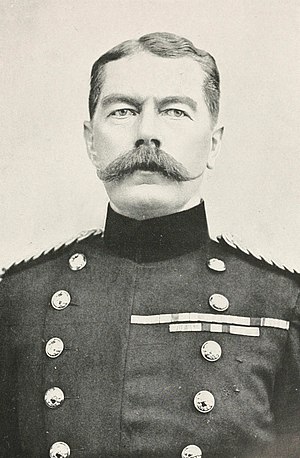Great Speeches of the War/Kitchener
EARL KITCHENER
[Speech of the Minister for War at the Lord Mayor's Guildhall Banquet on November 9, 19 14, in responding to the toast "The Imperial Forces of the Crown." In his speech Lord Kitchener spoke with quiet confidence in the Army in the field, and of the greater Army in the making.]
My Lord, Ladies and Gentlemen:—The generous terms in which this toast has been proposed and the manner in which it has been received will, I am sure, be highly appreciated by our soldiers in the field who have shown such undaunted courage and endurance in carrying out their duty to their King and country. It is pleasant for me to be able to tell you that every officer returning from the front has the same account to bring me:—"The men are doing splendidly." [Cheers.] Our Regular forces in France have now beside them both Territorial and Indian troops, and I am sure it must have been a pleasure to the Lord Mayor and the citizens of London to read Sir John French's eulogy of the London Scottish. The Indian troops have gone into the field with the utmost enthusiasm, and are showing by their courage and devotion the martial spirit with which they are imbued. [Cheers.]
I should like on this occasion to voice the tribute of praise, of high appreciation, and of warmest gratitude that we owe to our gallant Allies. We have now been fighting side by side with our French comrades for nearly three months, and every day increases the admiration which our forces feel for the glorious French Army. Under the direction of General Joffre, who is not only a great military leader but a great man, we may confidently rely on the ultimate success of the Allied Forces in the western theatre of the war. [Cheers.] In the East the Russian Armies, under the brilliant leadership of the Grand Duke Nicholas, have achieved victories of the utmost value and of vast strategical importance in the general campaign. [Cheers.] No words of mine are needed to direct attention to the splendid deeds of the gallant Belgian Army. What they have suffered and what they have achieved has aroused unstinted and unbounded admiration. [Cheers.] To Japan, whose sailors and soldiers have victoriously displayed their gallantry and fine military qualities side by side with our own men; to Servia and Montenegro, valiantly fighting with us the fight for the smaller nations; I wish to testify the admiration, respect, and gratitude of their comrades in arms of the British Army. [Cheers]
The British Empire is now fighting for its existence. I want every citizen to understand this cardinal fact, for only from a clear conception of the vast importance of the issue at stake can come the great national, moral impulse without which Governments, War Ministers, and even navies and armies can do but little. We have enormous advantages in our resources of men and material, and in that wonderful spirit of ours which has never understood the meaning of defeat. All these are great assets, but they must be used judiciously and effectively. [Cheers.]
I have no complaint whatever to make about the response to my appeals for men—and I may mention that the progress in military training of those who have already enlisted is most remarkable; the country may well be proud of them—but I shall want more men, and still more, until the enemy is crushed. Armies cannot be called together as with a magician's wand, and in the process of formation there may have been discomforts and inconveniences and, in some cases, even downright suffering. I cannot promise that these conditions will wholly cease, but I can give you every assurance that they have already greatly diminished and that everything which administrative energy can do to bring them to an end will assuredly be done. The men who come forward must remember that they are enduring for their country's sake just as their comrades are in the shell-torn trenches. [Cheers.]
The introduction of elaborate destructive machinery with which our enemies had so carefully and amply supplied themselves has been a subject of much eulogy on the part of military critics; but it must be remembered that, in the matter of preparation, those who fix beforehand the date of war have a considerable advantage over their neighbours; so far as we 
Earl Kitchener
(War Minister)
